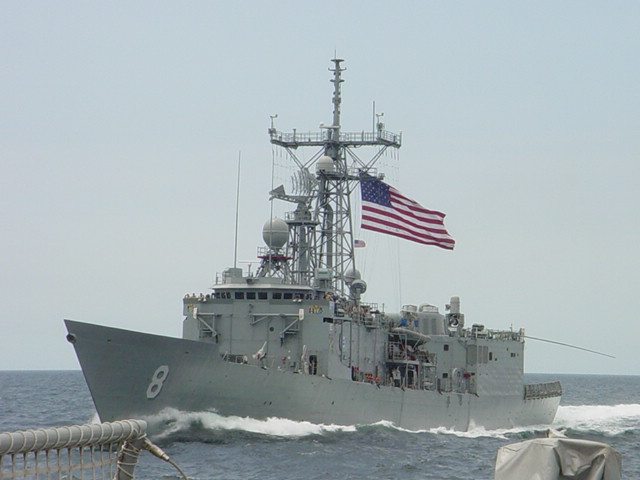The Pakistani warship, the PNS Alamgir, officially departed from Naval Station Mayport after several months of refurbishment and the training of its personnel on 21 March. It is scheduled to arrive at its home port in Karachi, Pakistan 53 days from now.
The PNS Alamgir started its life as the USS McInerney (FFG-8), an Oliver Hazard Perry class frigate. Pakistan acquired it from the U.S. under the Department of Defense Excess Defense Articles program because the U.S. Navy planned to decommission it after 31 years of service. Pakistan signed the transfer deal on 21 April 2010 and it was formally transferred during a ceremony at Naval Station Mayport on 31 August 2010.
The frigate underwent dry docking and pier-side refurbishment at BAE Systems Southeast Shipyards from September 2010 to March 2011 using $58.7 million of Foreign Military Financing funds.
The frigate is equipped with anti-ship missiles, a 76-mm naval gun, and torpedo launchers. It can also carry two SH-60 Seahawk multi-purpose helicopters.
There was an additional $6.5 million spent on specialized training on the ship’s engineering, navigation and combat systems for the crew of 240 Pakistani sailors during the overhaul.
The PNS Alamgir will join the Pakistan Navy Maritime Patrol (MARPAT) mission which is a critical piece in Coalition Maritime Forces counter-narcotics and counter-terror operations (CTF-150) as well as counter-piracy efforts around the Gulf of Aden, the Arabian Sea, the Indian Ocean and the Red Sea (CTF-151).
LCDR Raja Hussain, the Pakistan Foreign Military Sales Country Program Director for the Navy International Programs Office — the organization responsible for brokering the deal — said that the transfer is tactically crucial. “Pakistan is already an active partner in each taskforce and has even taken command of CTF 150 four times,” said Hussain. “This transfer not only strengthens the partnership between the two nations, but it will also pave the way for future military-to-military exchanges.”
The Pakistan Navy can also use the frigate to monitor its country’s coastline for illegal narcotics trafficking. “Over half of the heroin coming from Afghanistan is smuggled through Pakistan. There is a relationship as narcotics trafficking sometimes serves as a financial base for terrorist operations,” he said. “Therefore, missions on the coastline serve to increase stability in the region and enhance the national security of the United States.”











